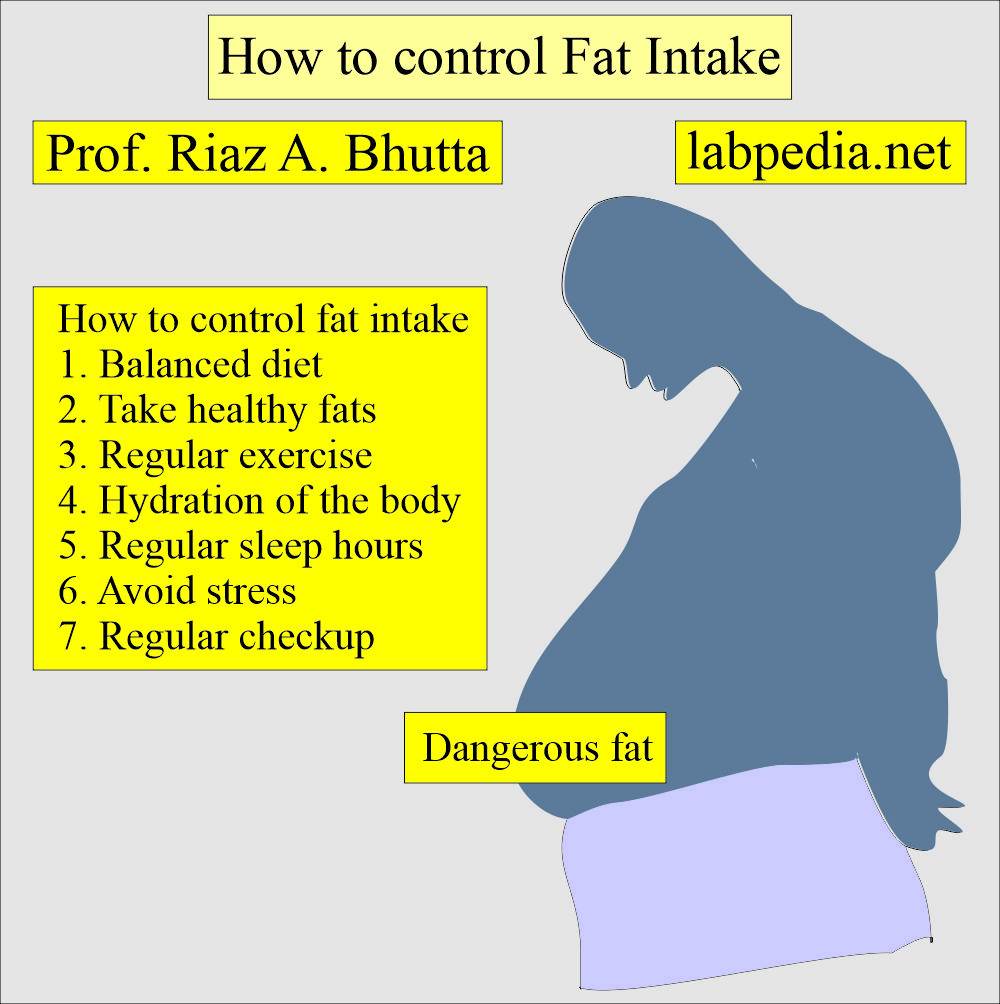How to Control Fat Intake
How to Control Fat Intake
- Fats supply chemicals called essential fatty acids.
- Fat intake in food in various forms is an issue for the developed world and the developing countries.
- In the USA, Americans consume a lot of fat in food or oil-cooked food. Most Americans get >40% of their calories from fatty foods.
- Only 20% to 30% have a healthy life.
- People believe oil (Ghee) has good nutritional value in developing countries. After the delivery, most pregnant ladies are given a cooked dish (Halwa). The idea is that it provides nutrition to the pregnant lady. I believe the primary purpose of such oily food (Halwa) is to relieve constipation.
What are the advantages of the fats?
Our body needs fats for:
- Healthy skin.
- Healthy cell growth.
- Fat transports some vitamins.
- It keeps food longer in the stomach, so one may not feel hungry.
- Fat stores in the body are a reserve supply of energy.
- Fats insulate your body from cold and heat.
- Fats cushion the vital organs.
- Our body can make fats from carbohydrates, protein, and fats.
Required Fat intake for various age groups:
|
|
|
|
|
|
|
|
|
|
|
|
- Butter, margarine, and oils are all fats.
- Fats may be hidden in foods like meat, fish, poultry, eggs, nuts and seeds, baked food, and dairy products.
What are the examples of fats?
- Whole milk with 3.5% fat looks low in fat at 3.5 grams/100 mL.
- The 8-ounce cup contains 8 grams of fat.
- Two cups will contain 16 grams of fat.
- One scoop (3 ounces) of ice cream will contain 5 grams of fat.
- Most people think low-fat food gives them less fat, and they may take double the amount. In the end, they will have more calories than eating a small serving of normal fat contents.
How much fat can you take according to the calorie intake/day?
| Calorie intake /day | % fat (of calories) | Fat in grams/day |
|
|
|
|
|
|
|
|
|
|
|
|
|
|
|
|
|
|
|
|
|
|
|
|
- Please always look carefully at the nutritional facts on the food box. Most food gives per serving the amount of fat.
Most foods use the following terms:
| Fat contents | Amount of fat per serving |
|
|
|
|
|
|
|
|
|
|
|
|
Some of the examples of various foods according to their fat contents:
| Type of food | Fat contents | Calories |
| Different types of potato |
||
|
|
|
|
|
|
|
|
|
|
|
|
|
0 gram | 65 |
|
|
|
|
|
|
|
||
|
|
|
How will you control fat intake (How to Control Fat Intake)?
- You can control the fats by the following precautionary measures:
- Balanced diet:
- Try to take a small portion of the food.
- The best way is to use small plates.
- Add rich sources of foods that contain nutrients like fruits, meat, etc.
- Try to avoid processed foods, as these foods contain sugars. These foods also contain unhealthy fats.
- A healthy diet should have balanced nutrients like vitamins, protein, and fiber.
- Addition of healthy fats: You can add healthy fats like:
-
- avocados
- Nuts.
- Seed.
- Olive oil.
- Cheese.
- Whole egg.
- Fish.
- Chia seeds.
- Extra virgin oil.
- Avoid saturated and trans fats like fried foods, processed snacks, and bakery products.
- Do not take a maximum of 10% of the total calorie intake of saturated fats.
- Saturated fats found in red meats are not good for health.
-
- Regular exercise:
- If possible, make a goal for your daily walk. That may be 5000 to 10,000/day. It depends upon you and your willpower to achieve that goal every day.
- Walking, running, and cycling are good forms of exercise.
- If you have the opportunity to swim, that is the best balanced exercise.
- It is recommended 150 minutes/per week of moderate-intensity exercise or 75 minutes/per day of vigorous exercise is recommended.
- Hydration of the body: Drink plenty of water.
- Some people recommend 8 glasses of water daily.
- Drinking enough water also keeps your skin healthy.
- Avoid stress: Stress may be the cause of overeating and will lead to weight gain.
- Stress makes you lazy and may not allow you to do exercise, yoga, and other activities.
- Regular sleep hours: Regular sleep of 7 to 8 hours is necessary for good health.
- It is believed that lack of sleep leads to hormonal changes and may be the cause of weight gain.
- Regular checkup: Keep the weight record.
- Regular checkup of the weight is very important to keep control of the body weight.
- If you do not control the regular check, then you may not be able to find changes in your body system.

